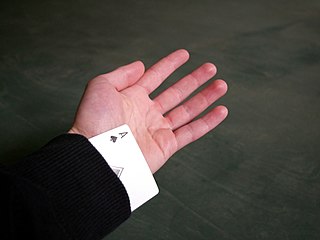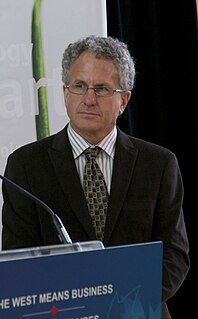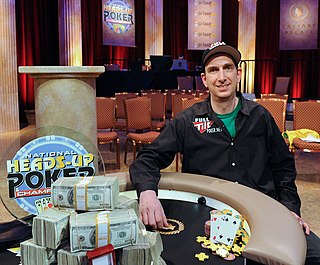Related Research Articles

Poker is any of a number of card games in which players wager over which hand is best according to that specific game's rules in ways similar to these rankings. Often using a standard deck, poker games vary in deck configuration, the number of cards in play, the number dealt face up or face down, and the number shared by all players, but all have rules which involve one or more rounds of betting.

Texas hold 'em is one of the most popular variants of the card game of poker. Two cards, known as hole cards, are dealt face down to each player, and then five community cards are dealt face up in three stages. The stages consist of a series of three cards, later an additional single card, and a final card. Each player seeks the best five card poker hand from any combination of the seven cards; the five community cards and their two hole cards. Players have betting options to check, call, raise, or fold. Rounds of betting take place before the flop is dealt and after each subsequent deal. The player who has the best hand and has not folded by the end of all betting rounds wins all of the money bet for the hand, known as the pot.

Cheating in poker is any behavior outside the rules that is intended to give an unfair advantage to one or more players.

Jonathan Herbert Schaeffer is a Canadian researcher and professor at the University of Alberta and the former Canada Research Chair in Artificial Intelligence.
Arimaa is a two-player strategy board game that was designed to be playable with a standard chess set and difficult for computers while still being easy to learn and fun to play for humans. It was invented in 2003 by Omar Syed, an Indian-American computer engineer trained in artificial intelligence. Syed was inspired by Garry Kasparov's defeat at the hands of the chess computer Deep Blue to design a new game which could be played with a standard chess set, would be difficult for computers to play well, but would have rules simple enough for his then four-year-old son Aamir to understand.
A computer poker player is a computer program designed to play the game of poker against human opponents or other computer opponents. It is commonly referred to as pokerbot or just simply bot.

Johnny Chan is a Chinese-American professional poker player. He has won 10 World Series of Poker bracelets, including the 1987 and 1988 World Series of Poker main events consecutively.

Duplicate bridge is the most widely used variation of contract bridge in club and tournament play. It is called duplicate because the same bridge deal is played at each table and scoring is based on relative performance. In this way, every hand, whether strong or weak, is played in competition with others playing identical cards, and the element of skill is heightened while that of chance is reduced. Duplicate bridge stands in contrast to rubber bridge where each hand is freshly dealt and where scores may be more affected by chance in the short run.
Kuhn poker is an extremely simplified form of poker developed by Harold W. Kuhn as a simple model zero-sum two-player imperfect-information game, amenable to a complete game-theoretic analysis. In Kuhn poker, the deck includes only three playing cards, for example a King, Queen, and Jack. One card is dealt to each player, which may place bets similarly to a standard poker. If both players bet or both players pass, the player with the higher card wins, otherwise, the betting player wins.

Philip Courtney Laak is an Irish–American professional poker player and a poker commentator, now residing in Los Angeles, California. Laak holds a World Poker Tour (WPT) title, a World Series of Poker (WSOP) bracelet, and has appeared on numerous nationally aired television shows.

Andrew Elliot Bloch is a professional poker player. He holds two electrical engineering degrees from MIT and a JD from Harvard Law School.

Heads up poker is a form of poker that is played between only two players. It might be played during a larger cash game session, where the game is breaking up and only two players remain on the table, or where two players are trying to start a game and playing heads-up while waiting for other opponents. It is also a necessary phase in most sit-and-go (SNG) poker tournaments; the single remaining tournament winner will at some point have to face only a single opponent. Alternatively, heads up poker may be played on purpose, either in a cash game format, or as a SNG, where two players play a winner-take-all tournament for a fixed, previously agreed upon amount of money. On larger online poker rooms and during certain tournament series, one may stumble upon larger heads up tournaments, usually in the shoot-out format. Usually, in order to ensure the fairness of the game, all players finishing at the same level of the tournament bracket will be paid out the same amount of money, no matter what their finishing place is.

Poker After Dark is an hour-long poker television program that originally aired on NBC, premiering on January 1, 2007. The series was canceled on December 3, 2011, following the "Black Friday" criminal case, which involved major sponsor Full Tilt Poker as one of the defendants. The show rebooted on August 14, 2017 with appearances from Tom Dwan, Daniel Negreanu, Antonio Esfandiari. Poker After Dark episodes are now filmed exclusively at the PokerGO Studio at ARIA Resort and Casino and Poker After Dark streams exclusively on PokerGO, a subscription video on demand service built for poker fans.
Ali Eslami is a business strategist and renowned high-stakes poker primarily focused on limit mix-games.
Duplicate poker is a variant of the card game poker. Duplicate poker is based on the principles of duplicate bridge, but it also incorporates some of the rules of pot limit and no limit Texas hold'em.

A game is a structured form of play, usually undertaken for entertainment or fun, and sometimes used as an educational tool. Games are distinct from work, which is usually carried out for remuneration, and from art, which is more often an expression of aesthetic or ideological elements. However, the distinction is not clear-cut, and many games are also considered to be work or art.

Douglas K. Polk is a semi-retired American professional poker player. Polk played under the alias WCGRider, specializing in heads-up No Limit hold'em (HUNL).
Cepheus is the first poker playing program that "essentially weakly solved" the game of heads-up limit Texas hold 'em. This was the first imperfect information game played competitively by humans to be essentially solved. It was developed by the Computer Poker Research Group (CPRG) at the University of Alberta and was introduced in January 2015 in a paper entitled "Heads-up limit hold’em poker is solved", published in Science by Michael Bowling, Neil Burch, Michael Johanson, and Oskari Tammelin.
Claudico is an artificial intelligence computer program designed to play no limit Texas hold 'em heads-up.
Libratus is an artificial intelligence computer program designed to play poker, specifically heads up no-limit Texas hold 'em. Libratus' creators intend for it to be generalisable to other, non-Poker-specific applications. It was developed at Carnegie Mellon University, Pittsburgh.
References
- 1 2 Glaister, Dan (July 27, 2007). "Chips are down as man beats poker machine". The Guardian.
- 1 2 "Polaris drawing professionals to a stand-still". University of Alberta: Express News. July 20, 2007. Archived from the original on May 23, 2008.
- ↑ "U of A researchers win computer poker title". Express News. University of Alberta. August 9, 2006. Archived from the original on July 6, 2011. Retrieved November 26, 2018.
- ↑ Johnson, R. Colin (July 26, 2007). "Humans deal computer a loss in poker challenge". EETimes.
- ↑ Harris, Martin (July 22, 2007). "The First 'Man-Machine Poker Championship' Begins Tomorrow". Poker News.
- ↑ Staples, David (June 11, 2007). "Poker pros out of luck in battle with 'bot". The Edmonton Journal. p. A2.
- ↑ Ayres, Chris (July 27, 2007). "How to beat a computer: lies, bluffing and taking risks are all on the cards". The Times Online.